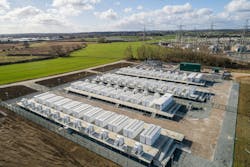ACL Energy Forms JV with BW ESS and Penso Power for 395 MW of Energy Storage Projects in Italy
ACL Energy, a Milan-based battery energy storage developer, has announced a joint venture (JV) partnership with BW ESS, an energy storage business, and Penso Power, a London-based developer of grid-scale battery storage assets with operations in the UK and Australia.
ACL Energy, BW ESS, and Penso Power will be joint shareholders in three development stage projects totaling 395 MW connection capacity, and together, the partners will fund the development expenditure.
"This joint venture is a fundamental pillar in our medium-long term strategy and consolidates ACL's ambition of becoming a leading player in the rapidly expanding energy storage business in Italy," said Nicola Locascio, ACL Energy Managing Partner.
The 111 MW project in Lombardia and the 97 MW project in Puglia have been submitted to the Italian Ministry of Energy for approval. The 187 MW project in Piemonte will be submitted for approval by the end of 2024.
According to the Italian TSO, Terna, Italy will require around 27 GW of energy storage capacity by 2033 to add a planned 120 GW+ of renewable generation to the Italian grid.
While the law firm Eversheds Sutherland was the advisor of ACL Energy, BW ESS and Penso Power were directed by Bird & Bird.
About the Author
EnergyTech Staff
Rod Walton is senior editor for EnergyTech.com. He has spent 17 years covering the energy industry as a newspaper and trade journalist.
Walton formerly was energy writer and business editor at the Tulsa World. Later, he spent six years covering the electricity power sector for Pennwell and Clarion Events. He joined Endeavor and EnergyTech in November 2021.
He can be reached at [email protected].
EnergyTech is focused on the mission critical and large-scale energy users and their sustainability and resiliency goals. These include the commercial and industrial sectors, as well as the military, universities, data centers and microgrids.
Many large-scale energy users such as Fortune 500 companies, and mission-critical users such as military bases, universities, healthcare facilities, public safety and data centers, shifting their energy priorities to reach net-zero carbon goals within the coming decades. These include plans for renewable energy power purchase agreements, but also on-site resiliency projects such as microgrids, combined heat and power, rooftop solar, energy storage, digitalization and building efficiency upgrades.
